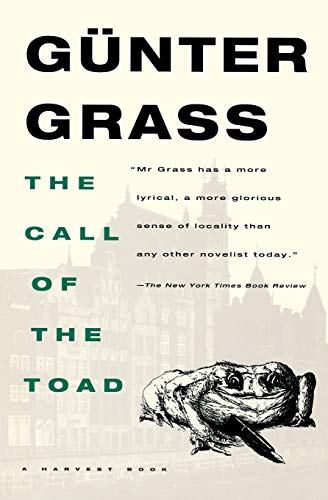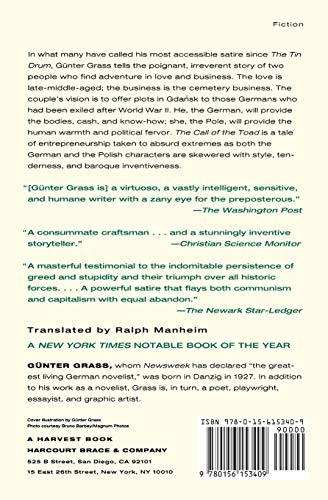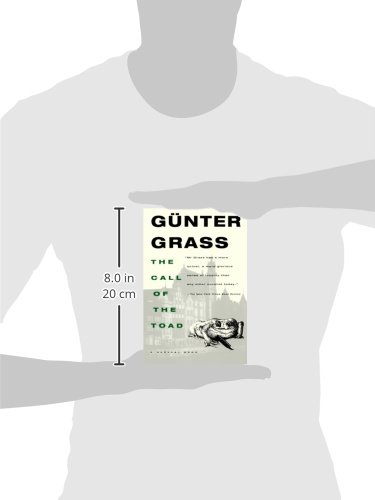Customer Services
Copyright © 2025 Desertcart Holdings Limited
Desert Online General Trading LLC
Dubai, United Arab Emirates




Full description not available
R**H
Another Great Book from Günter Grass
I have just about read everything by Günter Grass and enjoy his work. This one is no exception. A excellent insight into the lives and emotions of Germans, Poles and Immigrants in Gdansk, formerly German Danzig, during a time of German/Polish reconciliation, the reunification of East and West Germany and the fall of communism.
C**R
Five Stars
brilliant
R**N
An elaborate allegory concerning the new Germany and the new Europe
The novel begins with an encounter that can be encapsulated in a seemingly simple sentence: On All Souls' Day in 1989, an older German man, Alexander Reschke, who is visiting Gdańsk on business, meets a local Polish woman of similar age, Alexandra Piątkowska, as they both buy flowers at a stand in St. Dominic's Market.Actually, despite its simplicity, that is an historically dense sentence: Reschke had grown up in Gdańsk, when it was the Free City of Danzig. In 1944, as Danzig went up in flames, Reschke, then a seventeen-year-old member of the Hitler Youth, fled west. (But just how German was he, really? The family surname once was Reszkowski.) As for Piątkowska, she had been born in Vilnius, Lithuania, but her parents had fled from what once had been Polish territory to the "safer" Poland of Gdańsk. As for All Souls' Day 1989, that is a week before the symbolic fall of the Berlin Wall (the announcement by East Germany that all GDR citizens could visit West Berlin and West Germany) and the beginning of the "unification" of Europe.Alexander and Alexandra strike up a friendship and then jointly come up with the notion of a "reconciliation" cemetery in Gdańsk/Danzig in which displaced Germans who had fled the Free State could be buried back in their home soil. (Burial provides one significant tie to "All Souls' Day"; another is that Reschke, an art historian, had written his dissertation on "Memorial Slabs and Epitaphs in the Churches of Danzig".) Their vision of a reconciliation cemetery becomes the seed for the elaborate allegory that is the novel THE CALL OF THE TOAD: reconciliation and unification of Germans and Poles -- maybe, even, of all Europe.A lot of history must be overcome or finessed. And then, how to assimilate the swarms of "foreigners", who, in the novel, are personified by an enterprising Bengali named Chatterjee who starts up what becomes a booming rickshaw-bicycle business. Equally if not more problematical, how contain German entrepreneurialism and efficiency (the German-Polish Cemetery Association keeps expanding, turning into a new albeit peaceful German land grab, and the Deutsche Mark dominates at every turn).THE CALL OF THE TOAD is a deliciously clever allegory, and also a devilishly satiric and comedic one. The first two chapters are brilliant. The middle part lags somewhat, but over the last quarter of the novel the story accelerates and the complexity of the allegorical construction multiplies. The novel was published in 1992 and surely it is not as timely as it was then, although it is not wholly passé.As for "the toad", there are periodic references to the "call" or the "song" of the toad, a brief passage on "road-kill" toads, and stories about how the narrator used to swallow frogs and toads as a schoolboy trick. The narrator, by the way, was a boyhood chum of Reschke's in Danzig, and it is an easy and probably justified assumption that the narrator is none other than Günter Grass, who also grew up in Danzig and left in 1944. Each chapter begins with a striking line drawing of a toad -- the work of Grass. The translation by Ralph Mannheim is superb.Günter Grass died recently (April 13th). I am finding, as I myself am getting long in the tooth, an urge to read something by a noted author who has just died -- an eccentric sort of tribute, I suppose. The only other novel of Grass I ever read, over forty years ago, was "The Tin Drum", which I suspect constituted the primary ground for the award of the Nobel Prize to Grass in 1999. While THE CALL OF THE TOAD may not be of the same stature as "The Tin Drum", it is not unworthy of a Nobel laureate.
K**G
For Danzigers by a Danziger
It's an interesting book... if you know Gdansk or Poland. It is interesting because in this book Grass goes beyond his usual calls for Polish-German reconciliation. He suggests -- in no uncertain terms -- that if Poles want the Germans to accept the Polish authority over Gdansk, they themselves have to accept Lithuanian authority over Vilnius, the capital of Lithuania, which belonged to Poland for a number of years between the two world wars. Making this observation is very important given that we, Polish people, usually see ourselves as victims of history and rarely as culprits.One of the main qualities of the story is that it creates a very detailed picture of the very near future of Gdansk -- a future in which a park near the Gdansk Polytechnic gets converted into a German cementary, where certain German-Polish-Lithuanian reconciliation efforts are under way. Reading all the detailed descriptions of all the things Grass sees changing in Gdansk convinces me of his good knowledge of the city. The drawback of it is that the book is heavily time-stamped and probably not that interesting to those who do not know Gdansk or, at least, Poland.
K**I
On reconciliations and departures.
Reconciliation and forewell. As in the "Danzig trilogy", canvas of exclusively humane interplay of reconciliation's, changes and departures are painted. Grass commands knowledge of Polish and German things. Be it geography, local idioms, smell of the country sides. Descriptions of farmers market, streets and places, details of the appearance of mushroom (Boletus edulis), even description of soil is vivid. For a reader who, in his past, lived in Gdansk and knows first hand conditions of life in Poland, this book is a nostalgic trip into memories, source of reflections. There is this poetic melancholy in accepting changing world : ideals replaced with organised greed; Families decaying and destroyed; Brick wall coming down, walls between people building; Lakes desacrated by developments, their waters no more holding crawfish. Author is a keen judge of new world. He ackowledges manipulative genius of a great leader, and shallow pettiness of small; he regrets indiscriminate killings and impersonal wars of present.; he see ingrained prejudices (Polish vitriolic russophobia, German xenophobia) even in otherwise good people. Mellow and enchanting account of fast changing world. - For better ?
C**E
pretty good, but...
The writing was nice (though of course in translation) and the eye for detail and dialogue are both top notch. My ability to "connect" with this book, however, was not so good. Maybe that's my fault (ok, it is my fault), but I'm sure that others in America will have the same trouble. I can understand Nobel consideration just on his ability, but I'd have to read more than just this one (all I've read) to say I agree with the award. I just don't know anything about Poland or Germany. I'm sure that many others don't either. If you don't, you can still enjoy the writing, but that's probably where it will end, since the whole book will end up feeling very foreign. For me it was a distraction. If you want to read some Grass, I would recommend starting with something else...I wish I had. Overall, just average, I'm glad I read it, but I had higher expectations than it was able to meet.
A**R
Five Stars
great book
Trustpilot
1 month ago
3 weeks ago